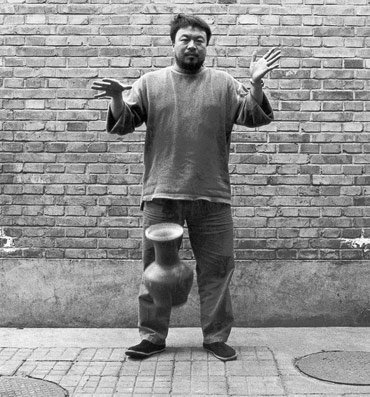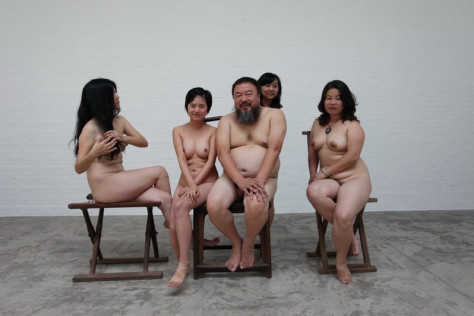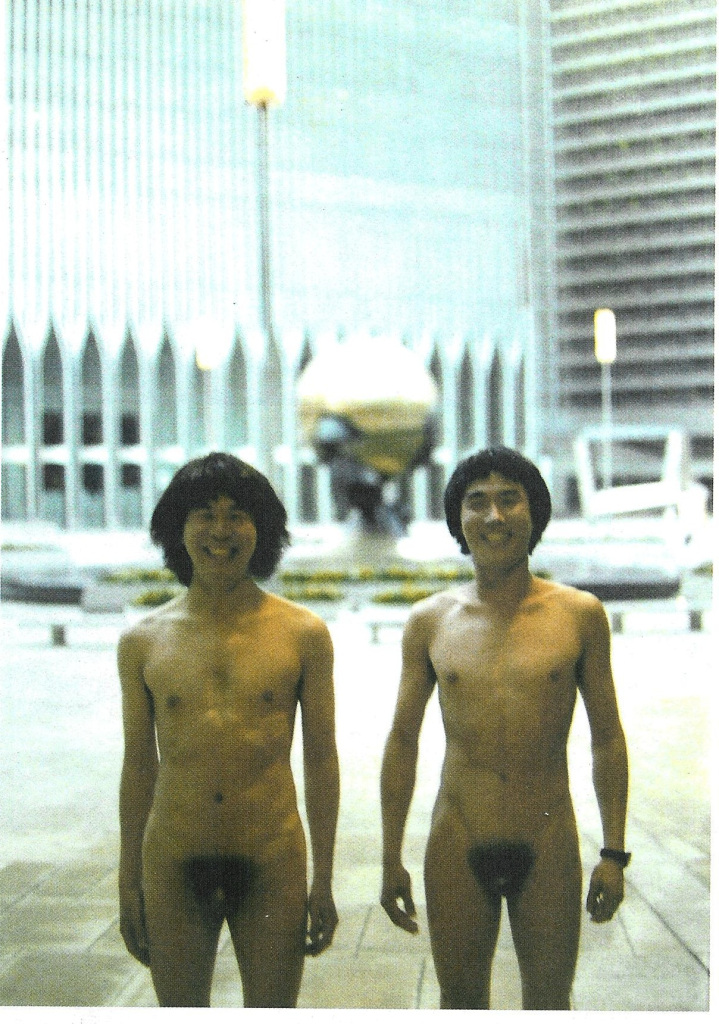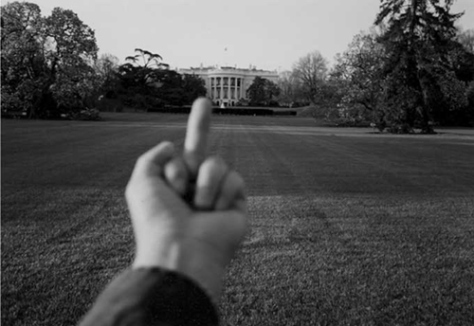Looking at two pieces of news this morning, I find myself wondering the following: did Ai really sacrifice himself to what he must have known would be a largely stubborn butting of heads of two major establishments, one in China (CCP) and one in the West (various media)? The two sides are far apart, but nonetheless demonstrate a strikingly similar degree of unwillingness to entertain subtlety.
A China Daily editorial
“The Ai Weiwei case, in essence, is not a human rights matter, nor is it about freedom of speech. No one is above the law. Just like in other countries, acts of violations of the law will be dealt with by the law,” the embassy wrote in the letter, carried in the English-language China Daily.
“Art is thriving in China. One can find art in all its forms and genres in China, from classical to post-modern, from Chinese to Western, from realism to abstract art,” it wrote.
The Chinese authorities have given few details of what exactly Ai is being investigated for.
Earlier this month, a Hong Kong newspaper under Beijing control said police had firm evidence he avoided tax.
In a sign of the sensitivity for Beijing, a Hong Kong-based rights group said on Thursday that a Chinese rock musician had been briefly detained by police after voicing support for Ai.
“It is natural for China and Western countries to see human rights and democracy differently given their different historical and cultural traditions and national circumstances,” the letter said.
“China is not the former Soviet Union. China has no need for ‘lecturers’, who cling to the Cold War mentality and follow double standards in their preachings.”
And following, an article by Jerome Cohen that appeared in the South China Morning Post, which I paste here in its entirety:
Despite public scrutiny, Chinese police continue to violate criminal justice
standards in Ai Weiwei¹s case, writes Jerome A. Cohen
Out of reach
By Jerome A. Cohen
It is now 24 days since artist-activist Ai Weiwei¹s detention by Beijing
police. Yet foreign media interest has not flagged, despite the silence of
the Chinese legal system and Chinese government efforts to manipulate
information. Ai¹s family still has not received the ordinarily required
notice of detention telling where he is detained and why.
There has been no attempt by police to justify this failure on the only
ground permitted by law that such notice ³might hinder their
investigation². Nor have the police claimed that Ai¹s case falls within the
narrow exceptions prescribed by law for extending a detained suspect¹s
detention beyond seven days without their seeking prosecutors¹ approval.
Ai¹s would-be legal advisers should have been permitted to meet him weeks
ago, right after detention. That is what the law requires except when the
police declare that the case involves ³state secrets², which they have not.
Yet police intimidation appears to prevent access to counsel even now. One
lawyer was himself illegally ³abducted² for several days after his
discussions with Ai¹s family. The other, by keeping himself incommunicado,
has thus far avoided the abduction, prosecution or illegal house arrest that
so many other human rights lawyers have recently suffered.
Without active defence counsel, there is no hope of making police and their
thugs accountable to other officials, including prosecutors, judges or
legislators, not to mention the public. Although in ordinary cases even
Communist Party leaders may have difficulty controlling local police, in
prominent cases such as Ai¹s one can assume that police follow high-level
party instructions.
Meanwhile, Ai¹s family and friends have sought to interpret and refute
whatever vague allegations Chinese officials have unfairly leaked to the
press in their efforts to diminish the strong condemnations by foreign
governments, media, and art and human rights groups that the case has
aroused. An early commentary in the party-controlled Global Times seemed to
confirm the widespread belief that Ai is being punished for his increasingly
daring public challenges to the party¹s arbitrary rule and restrictions of
freedom. This was soon overtaken by a report in the communist-connected Wen
Wei Po claiming that Ai was being investigated for ³economic crimes², bigamy
and pornography and that he ³has begun to confess².
The official Xinhua news agency confirmed that the investigation was
focusing on unspecified ³economic crimes², as did the spokesperson for the
Ministry of Foreign Affairs at a subsequent press conference. Although 10 of
the 18 questions asked at the press conference were about Ai, the answers
yielded little but were nevertheless entirely omitted from the official
transcript. A later Xinhua dispatch embarrassingly accused Ai of plagiarism
without checking its facts.
Since then, we have been treated to a broad range of rumours and
speculation. The most sensational, purporting to come from a disaffected
Xinhua journalist, claimed that, after having been tortured and shown a
video of the even more terrible police abuse of the courageous and long
³disappeared² lawyer Gao Zhisheng, Ai confessed to tax violations in order
to escape Gao¹s fate. Another report, from a foreign source close to certain
Chinese officials, suggested that Ai may yet be investigated for involvement
in one of Shanghai¹s many illegal land transactions.
Only three things can safely be said at this non-transparent juncture, as we
await the crucial decision on whether Ai will be formally arrested. One is
that the investigation now is indeed focusing on possible income tax
violations. Although we do not know why the police continue to detain Ai¹s
associate, former journalist Wen Tao, and probably several other employees,
we know that staff members, Ai¹s accountant, his business partners and his
wife were interrogated by tax officials as well as police.
Second, it also seems clear that, whatever the evidence being assembled
about tax evasion or other charges, this was not the motivation for Ai¹s
detention. This case started out on a ³detain first and look for
justification later² basis. If evidence sufficient to sustain a conviction
is found, the case will become a pre- eminent example of what criminal
justice experts call ³selective prosecution². Ai has been singled out from a
large number of potentially suspected offenders not because of the magnitude
of any alleged economic crimes, but because of his creative and eye-catching
political challenges to the regime and his defence of human rights.
Although China is rife with economic crimes that reach the highest rungs of
party, government and courts, the decision whether to detain and investigate
someone suspected of such crimes is often a political act that is influenced
by more than legal considerations. This is true to some extent in most
countries, but China¹s situation is extreme.
The business and tax activities of Chinese leaders and their families are
insulated from criminal investigation unless a leader loses a major power
struggle. So, too, are the activities of many business executives unless
they cross the politically powerful. In the rare instances when favoured
executives are caught in tax offences, they sometimes avoid detention and
criminal conviction, even if they had failed to pay huge amounts of tax;
they are quietly allowed to settle their liability by paying at least a
portion of what the tax authorities claim, plus an occasional fine. Thus,
even if the police find significant valid evidence against Ai, there would
be a precedent for terminating the investigation on a similar basis and
releasing him.
Finally, however the investigation of this case ends, it has already
demonstrated once again how China¹s police do not adhere not only to the
standards of fair criminal justice enshrined in the International Covenant
on Civil and Political Rights, which the Chinese government signed in 1998
but has yet to ratify, but also to their own country¹s criminal procedure
law.
If a famous figure like Ai can be so blatantly abused in the glare of
publicity, what protections do ordinary Chinese citizens receive from their
police?
Cohen’s analysis is of course solid, if we take the position that organizations such as the US-Asia Law Institute (at New York University Law School) are in the business of helping China figure out how to write and execute its own legal procedures. From the looks of it, the Chinese are not taking such advice, nor do admonishments by various major news organizations lead to anything but entrenchment of Chinese “policy,” such as it is. Which leads me back to previous question: did Ai have this all in mind when he toyed with, if not deliberately, crossed the line?








